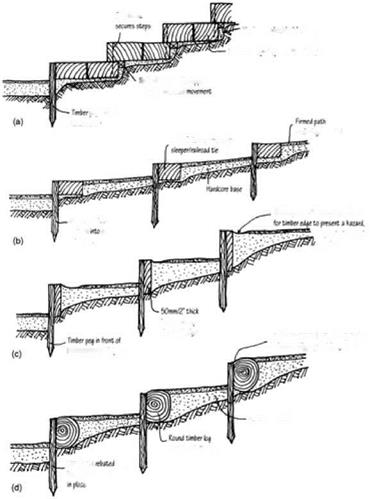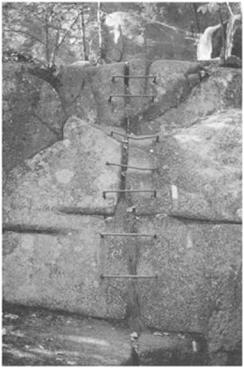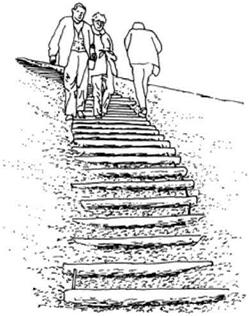Other forms of steps that are found in severe terrain include steel ladders bolted to rock faces, and iron steps set into rock. Such sections are almost always on pitches where rockclimbing skills are needed. They are not for the faint-hearted, but they do give non-climbers a taste for exciting ascents and
![]()
|

ГнИСірЧ Ц гИ и*л тфг Щр fie – &■ rata, Heumitttai bn
|
rbtT Ш£я JVif* Lffir |
|
F it it t-*+i*Lr n*j-j |
|
Inftnqi tf Уч m Ee cndf *d |
|
*#&TF4F*1* |
|
ач «да* |
|
|
|
|
|
![]() 4*WCi Ur №. mjp Ц b^tjir
4*WCi Ur №. mjp Ц b^tjir
|
h№iEiMd4*i*Kr |
К AE-Wf-rtpprrj) 1TJ Ы-Ч£ПЧЛ
4*-Ах« tJCtti
|
Г«Ьггрч
■flltf hj Ik-4*14
> ■
Various methods of timber step construction: (a) Solid steps made from sawn timber slabs or old railway sleeperslrailroad ties. (b) Steps edged with thick lengths of timber infilled with hardcore with compacted surfacing, (c) Boards set on edge tend to stick up if the infill erodes, and people may trip over them. (d) Round timber edges are likely to become slippery and dangerous, particularly for people with visual impairments.
descents. Holes are drilled, and the iron or steel is held in place by molten lead poured in to fill up the space (traditional), epoxy cement (modern and extremely strong), or expanding bolts. However, such steps are also visually intrusive and dangerous, and so they should be used only if other methods of ascent or descent are impractical.
|
This set of steel steps is part of a formidable and challenging trail up a precipitous series of rock cliffs and ledges. They present a physical challenge only a little less than that of rock climbing, where ropes are needed. However, they are not particularly attractive. Acadia National Park, Maine, USA. |
An ingenious system for climbing up extremely unstable material lying at a steep angle of repose, such as volcanic ash or sand, is to use a series of wooden crosspieces fixed at intervals along lengths of steel cable and laid on the surface. The climbers’ feet form temporary steps into the soft material,
|
A ‘sandladder’ made from round timber crosspieces fixed to two steel cables. This permits loose, easily eroded material to be climbed safely and with a low risk of surface erosion. Mount St Helens, Washington, USA. |
yet they cannot slip because of the timber, nor do they cause erosion. This has been called a ‘sandladder’.



